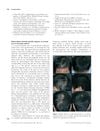 6 citations,
June 2011 in “Pharmacognosy Journal”
6 citations,
June 2011 in “Pharmacognosy Journal” Many products for hair re-growth exist, but a perfect treatment without side effects has not yet been found.
 September 2023 in “Authorea (Authorea)”
September 2023 in “Authorea (Authorea)” Certain peptides, caffeine, taurine, and an iron complex may improve hair regrowth when used with minoxidil and finasteride for hair loss.
 1 citations,
October 2021 in “Deleted Journal”
1 citations,
October 2021 in “Deleted Journal” Dupilumab can help regrow hair and improve skin conditions in patients with severe atopic dermatitis and alopecia areata.
 July 2024 in “Clinical Cosmetic and Investigational Dermatology”
July 2024 in “Clinical Cosmetic and Investigational Dermatology” Non-drug therapies show promise for hair regrowth but need more research.
 June 2018 in “Disease-a-Month”
June 2018 in “Disease-a-Month” Remove inflamed cysts surgically, avoid topical antibiotics on wounds, treat skin and mouth conditions with specific medications, and address underlying causes of hair loss.
 March 2024 in “Bioactive Materials”
March 2024 in “Bioactive Materials” New treatment using engineered nanovesicles in hydrogel improves hair growth by repairing hair follicle cells in a mouse model of hair loss.
 3 citations,
July 2018 in “European Journal of Dermatology”
3 citations,
July 2018 in “European Journal of Dermatology” An elderly man's hair grew back after treatment with secukinumab, possibly due to reduced scalp inflammation or the medication's direct effects.
 33 citations,
December 2005 in “Archives of dermatology”
33 citations,
December 2005 in “Archives of dermatology” Alefacept showed some effectiveness for alopecia areata but needs more research.
 12 citations,
June 2011 in “Han-guk sikpum gwahakoeji/Han'gug sigpum gwahag hoeji/Han-guk sikpum gwahak hoeji”
12 citations,
June 2011 in “Han-guk sikpum gwahakoeji/Han'gug sigpum gwahag hoeji/Han-guk sikpum gwahak hoeji” Lactobacillus plantarum-fermented plant extracts promote hair growth and thickness.
2 citations,
March 2017 in “JAAD case reports” Oral alitretinoin can quickly regrow hair in alopecia universalis.
 47 citations,
December 2019 in “Biomaterials”
47 citations,
December 2019 in “Biomaterials” Scientists have created a new hair loss treatment using ultrasound to deliver gene-editing particles, which resulted in up to 90% hair regrowth in mice.
 1 citations,
March 2015 in “Journal of Visualized Experiments”
1 citations,
March 2015 in “Journal of Visualized Experiments” Researchers developed a new, precise method to measure hair loss in mice using image analysis.
 June 2024 in “Indian Dermatology Online Journal”
June 2024 in “Indian Dermatology Online Journal” Topical tofacitinib is effective and safe for treating alopecia areata.
 4 citations,
August 2018 in “Facial Plastic Surgery Clinics of North America”
4 citations,
August 2018 in “Facial Plastic Surgery Clinics of North America” Platelet-Rich Plasma (PRP), a protein-rich extract from a patient's blood, shows promise in improving hair density, thickness, and quality, but the best method of use and number of treatments needed for noticeable results are still unclear.
 July 2024 in “Frontiers in Pharmacology”
July 2024 in “Frontiers in Pharmacology” Pilose antler extracts help hair growth by activating hair follicle stem cells.
 June 2014 in “Journal of biomedical research”
June 2014 in “Journal of biomedical research” Sargassum fusiforme extracts help promote hair growth.
42 citations,
March 2015 in “Anais Brasileiros de Dermatologia” Anti-TNF therapy can cause hair loss and skin issues.
1 citations,
December 2022 in “Bioactive Materials” The microneedle patch with quercetin, zinc, and copper effectively promotes hair regrowth for androgenic alopecia.
 April 2024 in “Journal of translational medicine”
April 2024 in “Journal of translational medicine” MJ04, a new compound, effectively promotes hair growth and is a potential topical treatment for hair loss.
 29 citations,
January 2004 in “Experimental Dermatology”
29 citations,
January 2004 in “Experimental Dermatology” Topical anthralin helped regrow hair in mice with a condition similar to human alopecia.
 36 citations,
April 1994 in “PubMed”
36 citations,
April 1994 in “PubMed” Cyclosporine A slows down hair loss from chemotherapy in mice, while dexamethasone increases hair loss but speeds up regrowth.
 26 citations,
August 2019 in “Stem Cell Research & Therapy”
26 citations,
August 2019 in “Stem Cell Research & Therapy” PBX1 helps hair stem cells grow and change by turning on certain cell signals and preventing cell death, which may be useful for hair regrowth treatments.
 9 citations,
January 2020 in “Skin appendage disorders”
9 citations,
January 2020 in “Skin appendage disorders” Hair loss from conditions like LPP and FFA can potentially be reversed with the right treatment.
 10 citations,
July 2012 in “International Journal of Dermatology”
10 citations,
July 2012 in “International Journal of Dermatology” Syphilis can cause hair loss and should be considered in unexplained cases.
6 citations,
July 2015 in “JAAD Case Reports” Doxycycline can effectively treat hair loss caused by EGFR inhibitors.
 January 2020 in “Jornal Vascular Brasileiro”
January 2020 in “Jornal Vascular Brasileiro” Anticoagulant therapy may cause hair loss, especially in women, and stopping the medication can lead to hair regrowth.
 8 citations,
August 2015 in “European Journal of Clinical Pharmacology”
8 citations,
August 2015 in “European Journal of Clinical Pharmacology” Rivaroxaban may cause hair loss.
 23 citations,
April 2018 in “Journal der Deutschen Dermatologischen Gesellschaft”
23 citations,
April 2018 in “Journal der Deutschen Dermatologischen Gesellschaft” Permanent hair loss from cicatricial alopecia is treated by reducing inflammation and managing symptoms, but regrowth in scarred areas is unlikely.
 1 citations,
July 2017 in “Clinical research in dermatology”
1 citations,
July 2017 in “Clinical research in dermatology” Hair loss, known as Androgenetic Alopecia, is often caused by hormones and can be diagnosed using noninvasive techniques. Treatments include topical minoxidil and oral finasteride, with new treatments being explored. There may also be a link between this type of hair loss and heart disease risk.
 24 citations,
January 1993 in “Dermatologic Clinics”
24 citations,
January 1993 in “Dermatologic Clinics” Minoxidil effectively treats hair loss, works better for women, and requires consistent use.


























